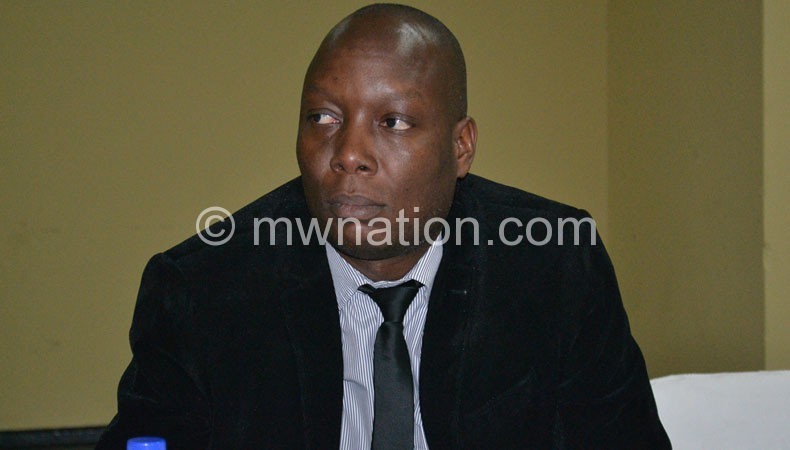ATI can be delayed, but not stopped
The Media in Malawi on Saturday commemorated World Press Freedom Day (WPFD) in Mzuzu, 11 months after a new government was ushered to power. ALBERT SHARRA caught up with Media Institute of Malawi (Misa) Malawi Chapter chairperson Thom Khanje to find out what the relationship has been like between the media and government.

Q:This month, President Peter Mutharika and Democratic Progressive Party (DPP) clock a year in power. What has been the relationship between government and the media?
A:To be fair, the President and his government have not done badly on freedom of the media although they have not lived up to their word on what they promised to do before and immediately after they took over power.
Q: What are these words the President and government have not lived up to ?
A : The administration has not done badly because the environment has generally been conducive to journalism with no serious cases of violence or aggression towards journalists by the government or its agents. In fact, when some overzealous police officers roughed up and arrested a journalist without apparent reason, they received condemnation from a very unusual source in the name of the government through the Minister of Information, Tourism and Culture Kondwani Nankhumwa. That was most likely a first in Malawi and is really worth noting.
The government has generally left the private media to operate freely. Apart from physical threats, there have also been no reports of media houses being denied government business or banned from State functions because of their writings and broadcasts critical of the administration.
And citizens in general have enjoyed their right to freedom as we have not experienced arrests, intimidation or threats against citizens for what they have said or written although social media has at times been awash with some abusive stuff against the President and his government.
However, there is still much to be done for Malawi to reach acceptable standards on media freedom. Yet the President can easily achieve these by simply delivering on what he promised on media freedom.
In case this has been forgotten, the President, starting with his campaign manifesto as well as his inaugural speech, first State of the Nation Address and other subsequent statements, promised a better environment and support to all documents that had been rusting during the previous regimes due to various reasons.
Q: Some of the promises the President made were the Access to Information (ATI) Bill and to sign the Table Mountain Declaration. These have not been done to date. What should we make out of this?
A : The President has more than once promised that his government will expedite the ATI Bill to provide the people of Malawi with an instrument for exercising their constitutional right of accessing information from public institutions.
One year down the line, there are no indications as to when the ATI Bill will come to Parliament. In any case, things seem to start getting familiar where promises by politicians to get the bill in Parliament have ended up with chains of excuses.
Secondly, the President promised to sign the Table Mountain Declaration through which the government will commit to repealing archaic laws in the country’s statutes that criminalises the work of the media.
On the contrary, the last time President Mutharika mentioned the Table Mountain Declaration was about him having never seen the document at all even though there are records that it was sent to his office.
In addition to the above, the President promised to free Malawi Broadcasting Corporation [MBC] from political control and manipulation. However, MBC has remained a political play ground and tool where the government and the ruling party not only monopolises coverage but also places its own people while victimising those perceived to be anti-government.
Unless the above mentioned issues are addressed just like the President promised, the other good things the government is doing on media freedom will go largely unnoticed. I see the Access to Information Bill being brought to Parliament and passed because it is a constitutional requirement to which no politician or any person has the right and power to deny the people. They can delay it, but they can’t stop it. It is just a matter of time before Malawians stand-up in numbers to stand up against continued delays to bring the bill to Parliament.
Q: It is five months since you were ushered into the office of Misa Malawi chapter chair. Can you briefly shed light on the experience so far?
A : Regarding my five months in office, I would describe the successful holding of the World Press Freedom Day Celebrations in Mzuzu—where we had a record turnout of 310 people, the Media Action for Society Initiative through which we mobilised and distributed K1.8 million worth of relief items to flood victims in Nancholi and Mitsidi in Blantyre, the partnership with the Journalists Union of Malawi and Media Council of Malawi to engage media employers on the issue of low salaries and poor working conditions for journalists and the composition of the Misa-Malawi national governing council into one of the few if not only female-dominated board with three women against two men as my highs.
My lows include failure by President Mutharika to live up to his promise to expedite the passage of the ATI Bill, sign the Table Mountain declaration and free MBC from political interference.





